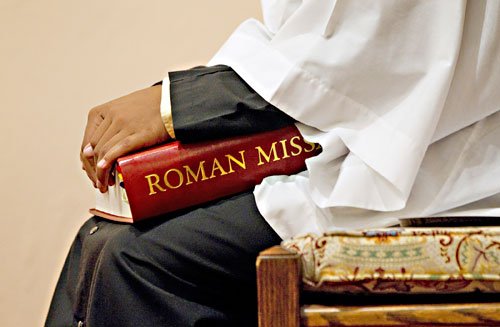Let priests decide on the mass
 French-speaking Catholics are about to face the same aggravation that overtook their English-speaking co-religionists at the end of 2011. That is when the new English translation of the rite of Mass was imposed in place of the translation that had been in use for 40 years. That translation was by no means perfect, but its language patterns were closer to those used in ordinary speech. The new English version tried too hard to represent the exact meaning of the Latin text of which it was a translation, and the same criticism is being made of the new French version. The clumsy term “consubstantial”, reintroduced into the Creed in both cases, is not really a translation at all but an archaic Latinism rooted in Greek philosophy.
French-speaking Catholics are about to face the same aggravation that overtook their English-speaking co-religionists at the end of 2011. That is when the new English translation of the rite of Mass was imposed in place of the translation that had been in use for 40 years. That translation was by no means perfect, but its language patterns were closer to those used in ordinary speech. The new English version tried too hard to represent the exact meaning of the Latin text of which it was a translation, and the same criticism is being made of the new French version. The clumsy term “consubstantial”, reintroduced into the Creed in both cases, is not really a translation at all but an archaic Latinism rooted in Greek philosophy.
The new English text has now settled down. Its imperfections are still apparent though familiarity has made it easier to swallow them. Yet the English-speaking Catholic world’s unhappy experience, which French speakers are about to replicate, has taught the authorities in Rome nothing. Centralisation, inflexibility and a cloth ear for language seem to go together. Comprehensibility is clearly not a priority. A love of good spoken English does not count; neither does opinion in the pews. These are sacred texts and worshippers treat them with the respect that is their due. But they have not embraced them joyously.
There is a solution, which only looks radical against the recent background of imposed uniformity but which is closer to the intentions of the Second Vatican Council. It is to loosen the reins of that uniformity so that parishes and their priests can begin to take ownership of their liturgy. When Pope Benedict responded to the unhappiness of priests and parishes who cherished the old Tridentine Rite by making that rite freely available to them, he set a precedent. Parishes already had the option to celebrate Mass in the post-Vatican II Latin version rather than the vernacular – an option of which insufficient use has been made – and Benedict gave them the right to use the previous Latin version too. There is no reason why the same principle should not be used to re-authorise use of the previous English translation, as an alternative to the three versions – post-Vatican II Latin, Tridentine Latin and the new (2011) English, already approved for use. In fact there is a fourth version available in England, the fine Anglican-based liturgy in use in communities of the Ordinariate. It seems Benedict was at heart a liturgical pluralist.
The same freedom of choice could be extended to French-speaking parishes, wherever their new translation causes difficulties. Allowing options like this would enhance the role not only of local bishops, who have been squeezed out of their proper functions regarding liturgy, but of parish priests. It is high time their status in the Church was enhanced by showing that the Church really trusted them. They are an under-appreciated asset, who have faced repeated blows to their morale. Yet they are the rock on which the local Church is built. Unlike curial officials they are in daily touch with ordinary people; they know instinctively what good liturgy feels like. The Mass is one of their primary tools of evangelisation. In consultation with their parishes and indeed their bishops, they should be free to choose whichever version of it they think most suitable.


 Votes : 0
Votes : 0









